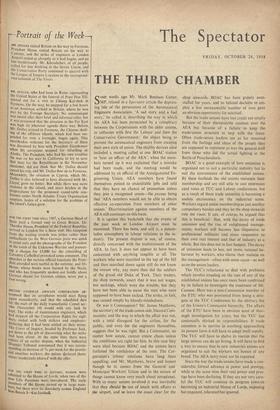THE THIRD CHAMBER
SOME weeks ago Mr. Mark Bonham Carter, MP, related in a Spectator article the depress- ing 'tale of the persecution of the Aeronautical Engineers Association. 'A sad story and a bad story,' he called it, describing the way in which' the AEA his been persecuted by a conspiracy between the Corporations with the older unions, in collusion with first the Labour and then the Conservative Government : the object being to prevent the aeronautical engineers from creating their own style of union. The shabby devices used included a meeting called at one BOAC station to 'hear an officer of the AEA'; when the mem- bers turned up it was explained that a mistake had been made, and the meeting would be addressed by an official of the Amalgamated En- gineering Union. AEA members have ,found themselves posted to undesirable jobs and told that they have no chance of promotion unless they join a recognised union—the excuse being that 'AEA members would not be able to obtain effective co-operation from members of other unions.' Discrimination against members of the AEA still continues on this basis.
It is against this backcloth that the events of the past week at London Airport must be examined. There has been, and still is, a poison- laden atmosphere in labour relations in the in- dustrY. The present dispute is not, of course, directly concerned with the maltreatment of the AEA. In fact, it does not appear to have been concerned with anything tangible at all. The workers who were marched to the top of the hill and then marched down again still do not know the reason why, any more than did the soldiers of the grand old Duke of York. Their leaders, the shop stewards, assert that it was not wages, but sackings, which were the trouble, but they have not been able to name the men who were supposed to have been sacked. The strike, in fact, was caused simply by bloody-mindedness.
Or was it Communism? Mr. James Matthews, the secretary of the trade-union side, blamed Com- munists; and the way in which the affair was run, with a total disregard for the airline, for the public, and even for the engineers themselves, suggests that he was right. But a Communist, no matter how astute, cannot create chaos unless the conditions are right for him. In this case they were ideal because BOAC and the unions have forfeited the confidence of the men. The Cor- poration's labour relations have long been appalling; and Mr. Matthews, brave and honest though he is, comes from the General and Municipal Workers' Union and in the nature of things cannot know very much about aeroplanes. With so many unions involved it was inevitable that they should be out of touch with affairs at the airport, and so leave the coast clear for the shop stewards. •BOAC has been grossly over- staffed for years, and its belated decision to em- ploy a less unreasonable number of men gave an obvious opportunity for mischief.
But the trade unions have lost credit not simply because of their disreputable conduct over the AEA but because of a failure' to keep the trade-union structure in step with the times. Often trade-union leaders are as far removed from the feelings and ideas of the people they are supposed to represent as was the general staff from those who did the actual fighting at the Battle of Passchendaele. '
BOAC is a good example of how unionism is organised not to suit a particular industry but to suit the convenience of the established unions. By these methods the old unions maintain their membership and are still able to cast enormous card votes at TUC and Labour conferences, but as a result of them trade unionism is becoming a useless excrescence on the industrial scene. Workers regard union membership as just another compulsory burden and they let the shop stewards rule the roost. It can, of course; be argued •that this is beneficial : that, with the:decay of trade unionism' and the rise of enlightened manage- ments, workers will become less responsive to professional militants and more responsive to their own real interest and that of industry as a whole. But this does not in fact happen. The decay of unionism leads to less, not more, rational be- haviour by workers, who blame their malaise on the management—often with some cause—as well as on the union leaders.
The TUC's reluctance to deal with problems which involve treading on the toes of any of the established unions has once more been confirmed by its failure to investigate the treatment of Mr. Cannon. Here was a non-Communist member of the ETU who was prevented from being a dele- gate at the TUC Conference by the abitrary fiat of the Union's Communist hierarchy. The affairs of the ETU have been in obvious need of thor- ough investigation for years, but the TU(' has continually shirked its responsibilities. If trade unionism is to survive in anything approaching its present form it will have to adapt itself rapidly. The TUC will have to shelve its maxim that the large unions can do no Wrong. It will have to find a way to ensure that in new industries unions are organised to suit the workers not bosses of any breed: The AEA story must not be repeated.
Since the war the trade unions have made a con- siderable formal advance in power and prestige, while at the same time their real power and pres- tige have been declining. If they are not very care- ful the TUC will continue its progress towards becoming an industrial House of Lords, imposing but impotent, tolerated but ignored.


































 Previous page
Previous page